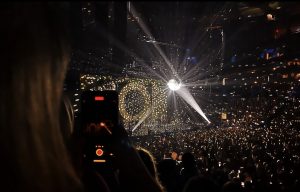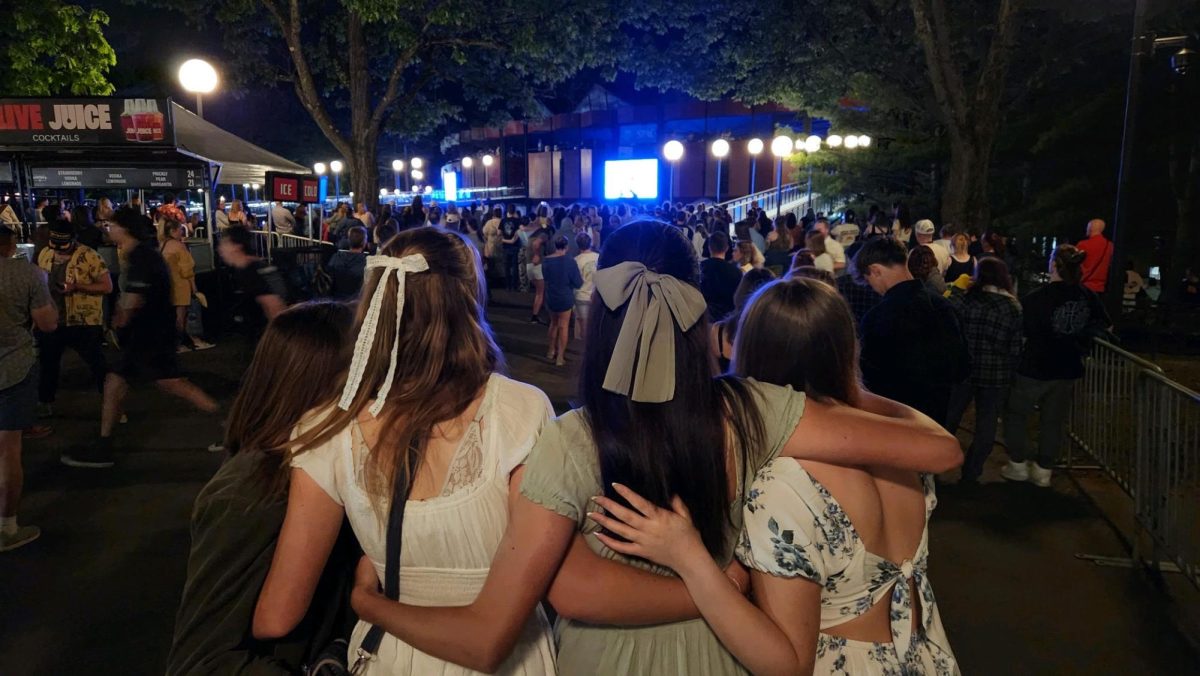As dusk approaches, the sky becomes painted in vibrancy. Yellows, oranges, pinks, and purples mesh together to create a once-in-a-lifetime viewing experience. In this instance, many would attempt to take a photo, only to be let down. No matter how high-quality of a camera you have, nothing can beat being in that exact moment, watching the sun set live, in-person.
Live music is the same.
Live music offers such a raw, vulnerable way to experience music that it is almost unfair to compare it to streaming. Live, the true essence of an artist is able to be experienced. Live, their real, unedited sound is able to come through. Live, their personality is able to shine on stage. As a bonus, fans are able to interact with one another live, in person, bonding through a shared love of music.
But all of those are abstract. It’s impossible to properly verbalize how an entire stadium can fall into a trance at one strum of a guitar or one click of a keyboard. What are the tangible benefits of listening to music live?
Live Music Cures All (or at least some)
Songs have the unique ability to emotionally move an audience in ways unparalleled by other forms of media. Songs can leave people feeling sad, nostalgic, energized, motivated, and just about any other emotion under the sun. In the hustle and bustle of our modern world, some look to music as a chance to unwind, relax, and recharge. However, music can be the perfect natural remedy to more than just a long day.
If you’ve been feeling stressed, live music could be your cure! Those who regularly experience live music reduce their stress hormone levels while simultaneously increasing their dopamine and oxytocin levels – which helps improve feelings of liveliness, companionship, and trust. Listening to music can also act as a “workout for the brain”; as your brain works to decipher the auditory input it receives, your creativity, memory, and alertness are all put to work. Music itself activates more areas of the brain than language, and studies show that infants are able to process music long before they can process speech.
Live music has even begun to be “prescribed” to patients with diseases such as Parkinson’s and dementia. Listening to music can promote neurogenesis – the growth of new neurons – to help keep your brain “young”. It also helps patients regulate their emotions better and have more control over their fine motor skills. Studies have even shown that playing music in the NICU can promote weight gain in premature babies, and help improve their vital signs.
Overall, live music could help you get through more than just a bad breakup or a rough day at work. It also has the incredible ability to strengthen your brain and can serve as a natural remedy for diseases and chronic conditions.
Listening in Harmony
The term “collective effervescence” was created by French sociologist Émile Durkheim in reference to the shared emotions and energy that occurs when a group unites for a single purpose. When attending a concert, onlookers feel a sense of community as they unite to experience music together. As a group makes their way through a setlist, they embark on an emotionally turbulent listening journey with emotional (and musical) highs, lows, and in-betweens. Junior music enthusiast Kylie Roach puts it best:
“When a mass of people are singing along to the same chorus, it can make for an extremely emotional experience, as different people from all over are coming together for a couple moments to create something beautiful.”
As someone who has been lucky enough to experience live music in numerous amount of different ways, I absolutely agree. Music is a universal language – something that is able to bring people from all walks of life together. The feeling of togetherness – the collective effervescence – that arises when a group of people are able to experience live music as one is absolutely something that should be sought out and cherished.
 A Tree in a Forest
A Tree in a Forest
However, live music does not only have an impact on the listener. The musicians themselves are also greatly able to benefit from their audience.
To hear more about how exactly playing in front of a live audience can impact a performer, I reached out to local musician John Maggard. Maggard has had a long withstanding music career, starring in his first rock band at 15, recording his first EP by 17, and releasing his third studio album by 23. After a “semi-retirement” from music, he decided to start from scratch again and rekindle his love for performing by playing more regional gigs with his current band.
Maggard enthusiastically stated that playing live “absolutely” has an impact on an artist. He remarked, “…playing music live to an appreciative audience is not something that can be described in full, it should be experienced. There is an intangible … chemical reaction and bond that happens between a performer and their audience. It is what keeps people buying tickets to the performances …, but it is also what keeps the performer performing.”
Mr. Keving McAvoy, LHS band and chorus teacher, supports Maggard’s take, agreeing that “…having a live audience appreciate your performance is why many musicians do what they do. It gives them purpose and it definitely helps create energy. Performers feed off the energy of a crowd which creates a more energetic performance and that, in turn, energizes the audience.”
Maggard left his closing remarks, referencing the popular paradox: If a tree in a forest falls with no one around to hear it, does it really make a sound?
“The same could be asked about a musical performer with no audience. Performing and listening is an interactive experience, giving benefits to all parties involved.”
Affordable Acoustics
Unfortunately, many can feel isolated from the bonds formed through live musical performances due to not being able to attend them. With the epidemic of concert ticket resellers growing, the prices of these experiences can quickly add up.
Luckily enough, these benefits can still be experienced without having to break the bank! All live music, whether it be at a restaurant, a musical showcase, a local theater production, or an underground bar show, all yields these cultural and physical benefits.
“ I think everyone should experience live music as often as possible. Being at a live performance is nothing like listening to a recording. The way the music surrounds you and the feeling you get by seeing the music get created before your eyes; it’s just so important to witness,” remarks McAvoy.
One should look to experience live music as often as possible, wherever possible, as music can be healing not only for the body, but the soul.



ashlyn • Jun 6, 2024 at 11:45 am
AVA YOUR WRITING IS INCREDIBLE!!! such an interesting topic!!